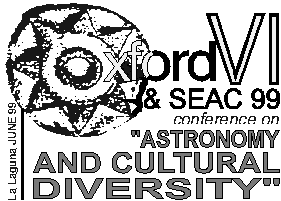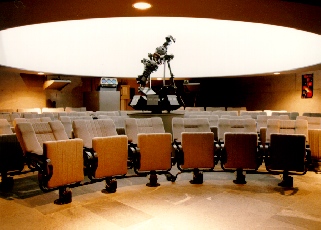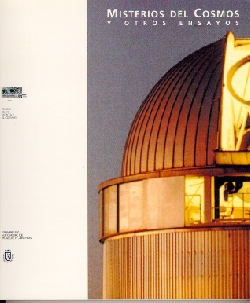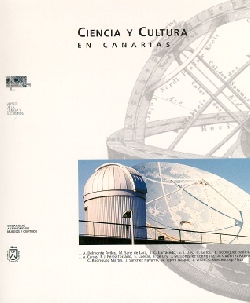 Contributions
Contributions Contributions
ContributionsThe sessions will take up to some 35 hours divided as
follows (subject to change):
a) 5 invited conferences (one
per day) of 45 min plus 5 min for questions, i.e. 50 min each.
We have already invited the following lecturers:
| Prof. Michael Hoskin. |
|
|---|---|
| Prof. Carlos Jaschek. |
|
| Prof. Stephen McCluskey. |
|
| Prof. Antonio Tejera Gaspar. |
|
| Prof. Alexander Gurshtein (public lecture). |
|
b) 10 invited reviews (one per
session) of 30 min plus 5 min for questions, i.e. 35 min each.
The following sessions are proposed (subject to updates and changes):
| General Topics and Methodology. |
|
| Astronomy and Landscape. |
|
| Calendars: cycles of time at the End of the Millenium. |
|
| Ethnomathematics and Ethnoastronomy: the sky of living people. |
|
| The Origin of the Constellations. |
|
| Astronomy in Islands: a peculiar evolution? |
|
| New Research in Traditional Areas: Eurasia. |
|
| New Research in Traditional Areas: Precolumbian America. |
|
| From the Atlas to the Caucasus: the other side of the Mediterranean. |
|
| Research in New Areas: Exotic Astronomies and Cultural Diversity. |
|
c) 50 contributed talks of 15
min plus 5 min for questions, i.e. 20 min each.
d) 50 short poster presentations
of 5 min plus 5 min for questions, i.e. 10 min each (optional).
This will allow more than 100 participants to intervene. However, depending on the number of delegates the 50 talks might make as much as 100 short presentations; hence as many as 150 participants would be allowed to speak if needed.
The official language of the conference will be English. However, some talks and short presentations in Spanish may eventually be accepted (not posters). Hopefully, simultaneous translation will be provided depending on the final budget although preference will be given to grants. However, for SEAC Annual General Meeting (AGM), the language tradition followed so far will be respected.


 Working Groups
Working GroupsDuring lunch time (2 hours) and in the evening, working groups can meet
up to discuss specific topics. Some have been proposed:
 Publication of the Conference Proceedings
Publication of the Conference ProceedingsThe Proceedings will be edited by the LOC and will be sponsored and published by the "Organismo Autónomo de Museos y Centros" of the Cabildo de Tenerife.
In principle, we hope to offer 10 pages for invited conferences and
reviews, 6 pages for talks and 4 pages for short presentations (posters).
All communications must be written in English with an optional extended
Abstract in Spanish.


Two months will be allowed after the meeting for final corrections. If no corrections are supplied, we will consider the first draft as the definitive version. In any case, September 1st is the definitive dead-line.
To attend the meeting will not necessarily mean to have the communication
published. Each contributed paper will suffer a referring process after
the conference.